| Construction Rating: | starstarstarstarstar |
| Flight Rating: | starstarstarstarstar |
| Overall Rating: | starstarstarstarstar |
| Diameter: | 3.94 inches |
| Length: | 37.00 inches |
| Manufacturer: | Semroc  |
| Skill Level: | 4 |
| Style: | Clone, Scale |
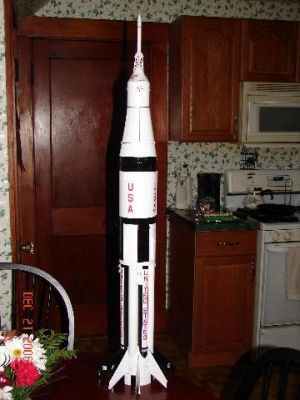
Brief:
This is a Retro-Repro kit by Semroc. What is a Retro-Repro? As quoted from Semroc Saturn 1B Instruction Manual:
"It is a reproduction of an out-of-production model rocket kit. It is a close approximation of a full scale model
of an early historically significant model rocket kit from one of the many companies that pioneered the hobby over the
past half century. It is not a true clone or identical copy of the original. It incorporates improvements using modern
technology, while keeping the flavor and build appeal of the early kits."
This kit offers a couple of interesting options for the builder. The first being the motor configuration. The builder can select a four engine cluster for standard 18mm engines or a single 24mm engine mount. The second is fin choice. The builder can either construct the enclosed built-up fins or use the enclosed 1/8 laser-cut balsa fins. The instructions indicate that the built-up fins are time consuming but give the builder the flavor of building the original model.
Construction:
The parts list is of course extensive for this model. It includes:
- 1 Apollo Capsule
- 8 BT-51N Body Tubes
- 1 BT-70V Body Tube
- 1 BT-100Z Body Tube
- 1 BT-101T Body Tube
- 2 ST-990 Body Tubes
- 4 ST-730E Body Tubes
- 1 ST-940E Body Tube
- 2 Launch Lugs LL-180
- 1 Laser-cut Fin Set (3)
- 1 Thrust Ring
- 1 Launch Lug LL-320
- 1 Elastic Cord
- 4 Engine Hooks (for 18mm motors)
- 1 Engine Hook (for 24mm motor)
- 3 Tube couplers
- 1 Wood Dowel
- 1 Center Ring Set (3)
- 1 Body Wrap Set (5)
- 1 Shroud Sheet Set (3)
- 1 Chute Pak
- 1 Decal Set
- 1 Saturn 1B Ruler (Yes, you get a ruler with important marks pre-set.)
- 1 Instruction Manual
[Note: The two glues recommended for the build are super glue and either white or wood glue. I found a great wood glue that I used for the first time on this kit and will always use it going forward. It's Elmer's Probond Interior/Exterior Wood Glue. It's weatherproof and fast tack. The fast tack feature that drew me to the glue, and for me it was a lifesaver. You don't have to wait around holding pieces together for them to setup. Just a few seconds and this glue is already setting up.]
The first thing that hits you when you open the box is that this kit is of very high quality. This vendor obviously takes great pride in its product. Everything is top notch all the way.
The instructions were laid out well and very easy to follow. This kit did not consist of a lot of sub-assemblies. The only real sub-assemblies were the fins and the capsule. For the most part it's a straightforward, linear build.
The first step is a decision point. You need to choose the engine mount configuration. Either a 4 engine 18mm cluster or a single 24mm configuration. I chose the 4 engine cluster.
Things to consider when making the motor selection decision: Using a single engine increases the risk of ejection failure. However, using a single 24mm mount will allow the use of reloads. On the other side, using a cluster increases the risk of some type of ignition failure.
The tank tubes are attached to the stuffer tube and engine mount assembly. I pre-painted the tank tubes, 4 white and 4 black. This painting was not indicated in the directions. I did this to make it easier for me to paint later on...
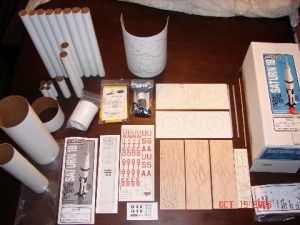

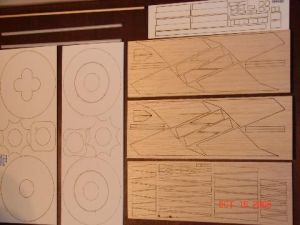
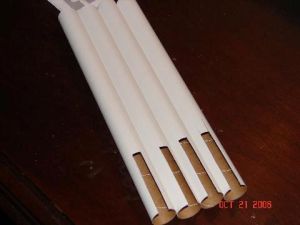
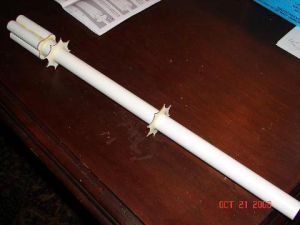
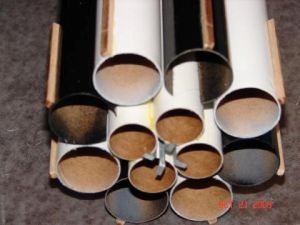
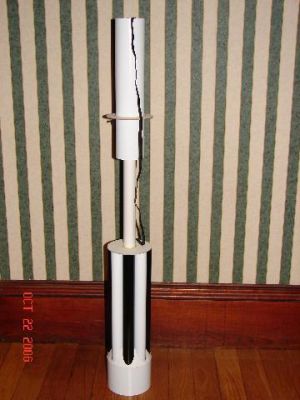
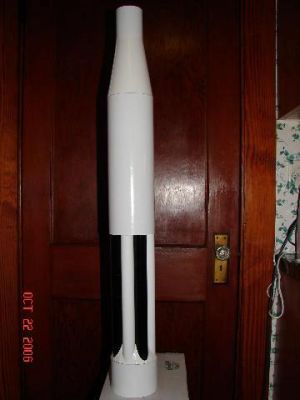
Cutting out and gluing the fairing shroud in Step 27 is a potential "gotcha" only if you try to over think it. For me it was a bit daunting looking at that shroud and think about all the cutting I had to do. I just took my time with a sharp razor knife and it came out great. When gluing the shroud, be sure to check for fit first to make sure everything lines up well. You only get one shot gluing the shroud on, especially if you use a fast tack glue.
Putting the wraps on comes at step 36 and is very straightforward. Just line up the edges and place the wraps where the instructions indicate. Just make sure to put them on right side up.
Another possible "gotcha" would be to use too much glue and/or to do too much smoothing of the wraps. You don't want to knock down the corrugated look. If you use too much glue or pull them too tightly, you will cause the wraps to go out of shape.
The fin creation steps 38-44 are the second major decision point: either create the built-up fins or use the laser cut balsa fins.
The balsa fins look respectable, but I went for it and created the built-up fins. The parts used to create the built-up fins are small but fit together well and I was very happy with the results.
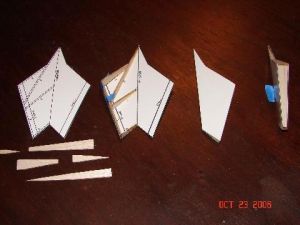
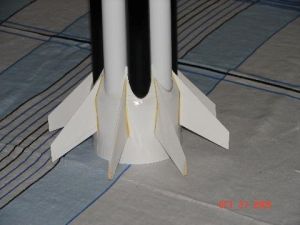
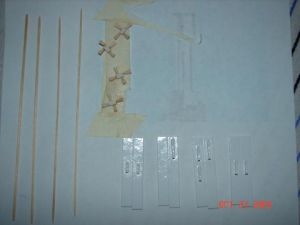
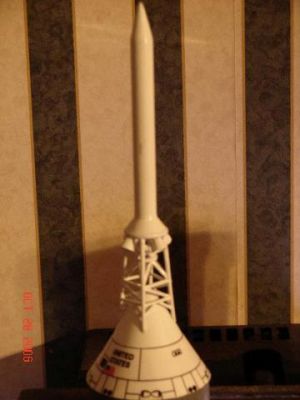
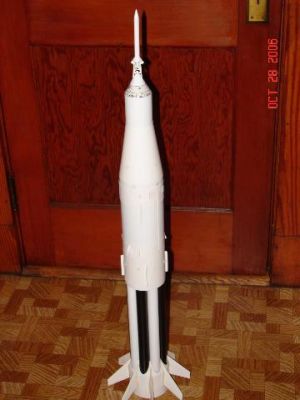
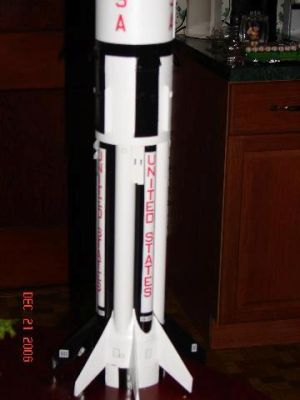
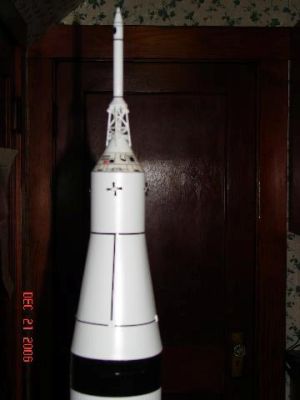

After the fins are on it's all final detail work.
During the detail construction the only thing I didn't use on the model was in step 56 (four retro-rocket housings). I ended up making my own from spare balsa. I just couldn't get the right look with the cut-outs provided on the shroud sheet. I'm happy with the results. Since I didn't use the stock housings, I used the alternate launch lug placement option. The instructions give you two options for mounting the launch lugs. The first utilizes one of the housings to hide the launch lug under the housing. The second option is just mounting the lugs on the rocket exterior.
The capsule comes in its own zip lock bag. It looks like it's going to be an easy task, but there is a lot to it and it takes a good deal of time to complete. Building the tower structure was probably the most difficult part of the entire build for me. The final product though is straight and sturdy so I'm pleased with the results.
Finishing:
Painting this model of course is a challenge. Although even for those of us who are paint challenged, it's doable if
you use good paint tape, take your time, and mask carefully. [Note: My paint job does not exactly match the suggested
paint scheme. Specifically the lower fin paint scheme differs from the suggested scheme a bit. Also it being December
in New England, I will clear coat the entire model once the weather gets warm enough to do so (outside).]<>
If you are a perfectionist, then you are in for a wild ride. I am really pleased with the finished product and am hoping that maybe Semroc will someday come out with the Saturn V. If they can do this good of a job with the Sat 1B, the Sat V would be awesome.
PROs:
- This rocket looks great when it's painted and the decals are on!
- I pre-painted the eight body tubes 4 black and 4 white. This saved me a lot of time later on since painting these tubes after assembly would be challenging. Just don't paint the two spots that attach the tubes to the two stuffer tube stars.
CONs:
- Obviously the Sat 1B has got a lot of detail and that makes it very challenging to mask and paint. It takes patience and time to get it done right.
- My recommendation is just don't rush it.
Construction Rating: 5 out of 5
Flight:
The recommended motor for the 18mm 4 engine cluster configuration is 4 C6-3s. I used the recommended motor for the
first flight. [Note: You cannot use the regular Estes controller to launch cluster rockets. You need to use a launch
controller that runs on 12 volts so that you have enough juice to light all four engines.
Preparation for flight was relatively simple. I packed wadding into the parachute tube and made the necessary igniter connections on the 4 engines. It took a while to make the connections, but it was fairly simple to do.
The rocket lit on all 4 motors sending it straight up off of the pad. It arched over just a bit as it made its way up to I'd say 500 feet or so... I can't say for sure. Ejection was just after apogee. The main rocket body floated down separately from the capsule which has its own chute. Both were recovered without incident. Nothing broken! The first flight was pre-final paint and clear coat. Once I clear coat the rocket I will fly it again, but it will be a bit more difficult to push that button...
Recovery:
PROs: Awesome looking flight and rocket! This build challenged me to go far beyond what I thought I could do. It was
one of the best building experiences that I have ever had. I even chose to create the built-up fins rather than the
laser cut fins! That equals not taking the easy way out and I am very happy I took the long road. I feel like I really
got a feel for how the original Estes kit build was like.
CONs: None that I saw.
Flight Rating: 5 out of 5
Summary:
This was a challenging build that made me step up my game. One of the most enjoyable part of this build was that it
was extremely challenging and rewarding at the same time. It sure as heck makes a 3 or 4 fin rocket look a whole lot
easier... Everything made perfect sense. The instructions were clear and understandable. This was my first Semroc kit,
but won't be my last. The quality of the kit was outstanding in every area. My hat is off to Semroc!
Painting is no doubt something that takes time and patience on this rocket. There isn't any way around it; it's just something that those of us who are paint challenged have to deal with.
Overall Rating: 5 out of 5
Other Reviews
- Semroc Saturn 1B By Duane and Keith Boldt (October 25, 2009)
Brief: 1/70 scale, 18mm cluster of 4 motors or single 24mm motor mount Construction: 18 body tubes + Apollo capsule kit 8 laser cut balsa fins or more advanced cardstock over balsa frame Choice of single 24mm motor mount of cluster of four 18mm motors 10 centering rings Various dowels for sanding and building capsule escape tower Many other laser cut parts for ...
- Semroc Saturn 1B By Chan Stevens (January 1, 2007)
After teasing the rocketry community for nearly a year, Semroc finally released the reproduction 1/70th scale Saturn 1B just in time for Christmas. Faithfully reproduced based upon the 1967 Estes design (K-29), this kit is a very challenging but rewarding build. This is not for the faint hearted, nor for the rocketeer looking for a weekend project. Standard design calls for the original ...
 |
 |
Flights
 |
 |
R.M.G. (March 8, 2008)
 |
 |
D.W.M. (February 4, 2007)